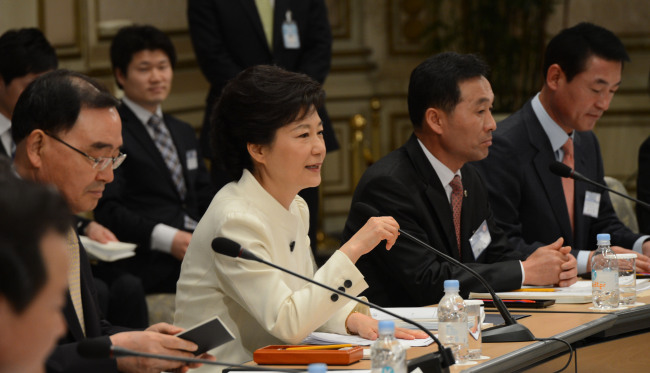Public security authorities plan to introduce an online crime map, allowing the public to check what offenses have been reported in their neighborhoods.
In a policy briefing to President Park Geun-hye, the Ministry of Security and Public Administration said it would complete the database by 2015. When it is completed, the public can search for information on crimes, such a sexual assault and school violence, that have taken place by region.
Minister Yoo Jeong-bok noted that the map would alert people who live in areas prone to crimes, and make police more accountable. The ministry also announced Friday that it would seek to increase the police force by 20,000 in five years.
The measures are part of Park’s pledge to strengthen the security of people’s lives. Park has vowed to crack down on what she called the “four social evils”: sexual crimes, school violence, food-related crimes and crimes that destroy families.

President Park Geun-hye speaks during a joint policy briefing of the Ministry of Security and Public Administration and the Ministry of Justice at Cheong Wa Dae on Friday. (Chung Hee-cho/The Korea Herald)
The New York Police Department has utilized a system called “CompStat,” which uses databases and geographic information systems to record crimes and predict type, location and time of future crimes
The NYPD’s mapping system has proven its effectiveness and efficiency in curbing crimes since the 90s.
Apart from beefing up public security, the ministry also announced that it would disclose an extensive amount of data and information on public offices.
Currently, government data are available to the public only on request. But the ministry said it would launch a website (data.go.kr) by 2014 to make better use of data and information to increase a business’ chance of success and develop an idea into a workable reality.
The Ministry of Justice also reported a master plan to secure public safety by using high-end technology which it hopes to be effective and efficient measures to prevent heinous crimes that threaten the lives of the people.
“The ministry will make society a safer place by adopting high-end technology in deterring crimes against women, children and other social members left in the blind spot of human rights protection such as marriage immigrants,” said Minister Hwang Kyo-ahn.
He said the ministry would adopt a more advanced type of electronic anklet for serial rapists or killers, which are expected to help in predicting an occurrence of a crime by analyzing the criminal records and behavioral pattern of ex-convicts.
Public concern has been on the rise since a string of shocking crimes over the last year.
Last April a Korean-Chinese man named Wu Yuanchun killed a 27-year-old woman in the city of Suwon after failing to rape her. Wu then sliced her body into more than 200 pieces.
According to a Justice Ministry report, sexual assault cases increased 96 percent to 19,000 in 2011 compared to cases in 2007.
Sexual assaults against teenagers and children also increased 93 percent to 4,000 and 16.2 percent to 702, respectively, during the same period.
The ministry will also prepare measures for marriage immigrants who often fall victim to domestic violence.
Recent murder cases of immigrant brides infuriated Korea as well as the countries of the brides, mostly Southeast Asian nations including the Philippines, Vietnam and Cambodia.
More interpreters for immigrants will be provided from the first stage of investigation for domestic violence.
Victims and their children will be able to receive medical services, counseling and legal assistance through support centers for victims or facilities for immigrant women.
Hwang also said the ministry will set up a task force in charge of protecting intellectual property.
Infringement on intellectual property has long been pointed out as the culprit that eats out the brand image and economy of the nation.
Not only does the ministry clamp down on manufacturers of counterfeit products, but also will crack down on those breaching intellectual property through illegal torrent service, which is a peer-to-peer file sharing and used to distribute a large amount of data on the Internet.
The ministry will work with related government agencies such as the Ministry of Culture, Sports and Tourism, the Korea Copyright Commission and the Korean Intellectual Property Office in deterring illegal file sharing on the internet and mobile network.
The ministry also pledged to push for reform of the prosecution to regain public trust.
The justice minister said it will abolish the Central Investigation Unit, which handles cases involving high-ranking government officials, businessmen, and politicians.
The CID was often blamed for its political bias and lack of political neutrality.
The acquittal rate from 2008 to 2011 was around 10 percent, almost 30 times higher than that of other cases, according to a Justice Ministry statistics.
“A permanent independent counsel will replace the special unit,” said Hwang at the briefing.
Downsizing the workforce in the prosecution and strict punishment
of irregularities by prosecutors are part of the planned reform.
Briefed about the ministry’s policy direction, President Park said the authority should regain public trust through strict discipline and a thorough reform.
President Park has long pledged to achieve reform in the prosecution since her presidential campaign last December after the prosecution had been embroiled in a series of scandals such as a sex-for-favor case involving a prosecutor and a suspect.
By Oh Kyu-wook and Kim Young-won
(596story@heraldcorp.com) (wone0102@heraldcorp.com)



![[Herald Interview] 'Amid aging population, Korea to invite more young professionals from overseas'](http://res.heraldm.com/phpwas/restmb_idxmake.php?idx=645&simg=/content/image/2024/04/24/20240424050844_0.jpg&u=20240424200058)


